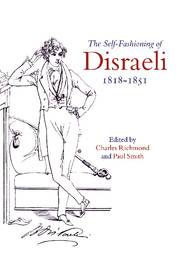Book contents
- Frontmatter
- Contents
- List of contributors
- Preface
- Introduction
- 1 Disraeli's education
- 2 Disraeli's romanticism: self-fashioning in the novels
- 3 Disraeli's crucial illness
- 4 Disraeli and orientalism
- 5 ‘A Hebrew to the end’: the emergence of Disraeli's Jewishness
- 6 Disraeli's interpretation of English history
- 7 Disraeli's politics
- Notes
- Index
7 - Disraeli's politics
Published online by Cambridge University Press: 19 March 2010
- Frontmatter
- Contents
- List of contributors
- Preface
- Introduction
- 1 Disraeli's education
- 2 Disraeli's romanticism: self-fashioning in the novels
- 3 Disraeli's crucial illness
- 4 Disraeli and orientalism
- 5 ‘A Hebrew to the end’: the emergence of Disraeli's Jewishness
- 6 Disraeli's interpretation of English history
- 7 Disraeli's politics
- Notes
- Index
Summary
‘Madam, Mr Di has had to make his position, & men who make their positions will say & do things, wh: are not necessary to be said or done by those for whom positions are provided.’
Lord Stanley's words in overcoming the Queen's reluctance to accept Disraeli, during his abortive attempt to form a ministry in February 1851, may stand in their urbane cynicism for the prevalent view of his subordinate's political character, then and since. The opinions Disraeli professed and the courses of action he pursued have most often been viewed, with greater or lesser reprobation – from John Bright's clucking at his inability to ‘comprehend the morality of our political course’ to Benjamin Jowett's only half-reluctant appreciation of ‘a rascal whom I rather like for his pluck & his cleverness’ – as functional purely to the purpose of advancement in political life.
It is not an interpretation that ruffled Disraeli overmuch. He did not see politics, any more than life in general, as a moral gymnasium, in which the egoism of the individual could be sublimated simply by the strenuous assertion of principle or disinterested exertion for the public good. The political arena, like other arenas, was a proving ground of the self, and the Disraelian self carried its own morality in its knapsack, along with its marshal's baton. The words ascribed to Stanley above are Disraeli's own, his recollection of what Stanley told him after seeing the Queen.
- Type
- Chapter
- Information
- The Self-Fashioning of Disraeli, 1818–1851 , pp. 152 - 173Publisher: Cambridge University PressPrint publication year: 1999



